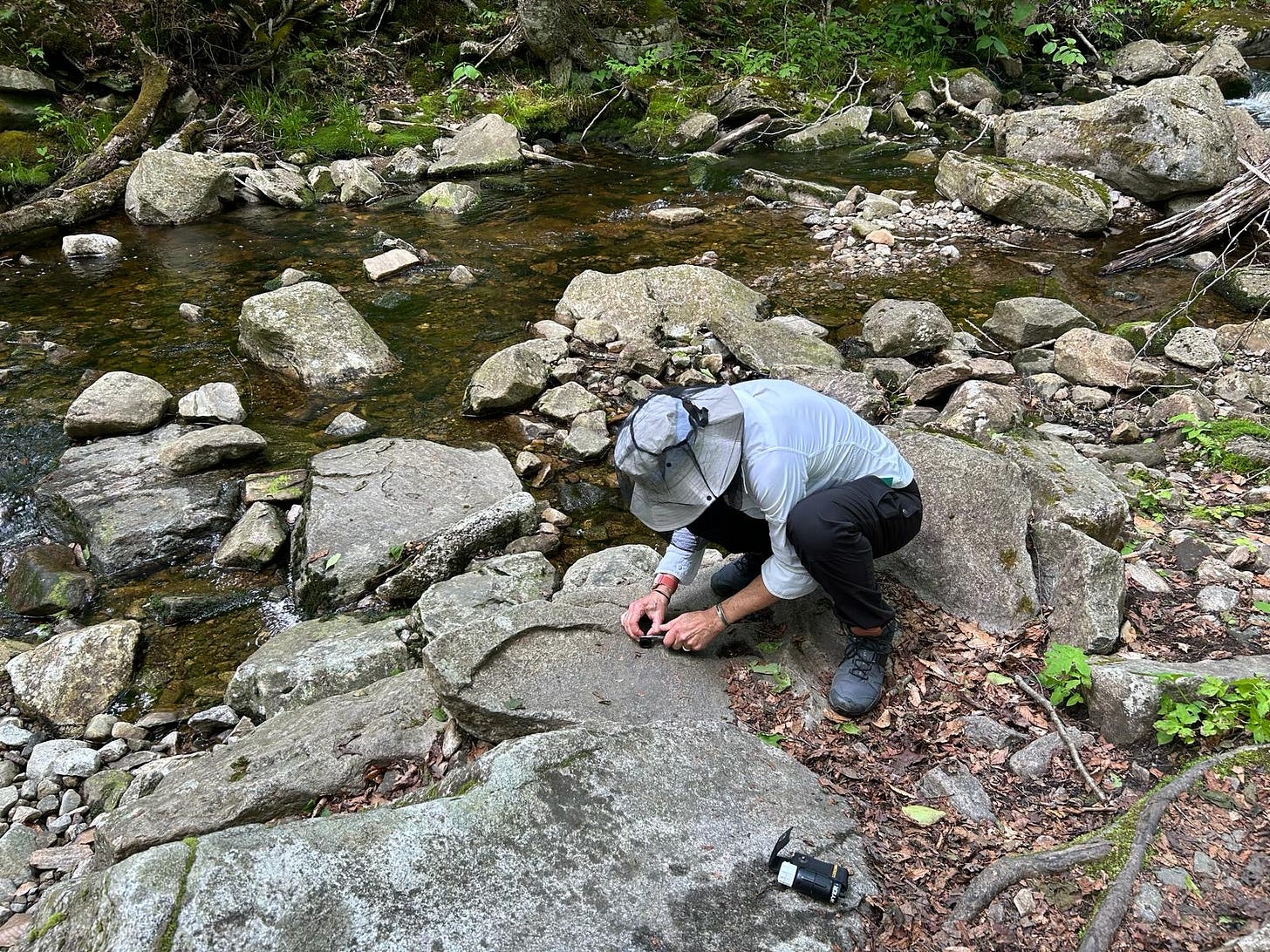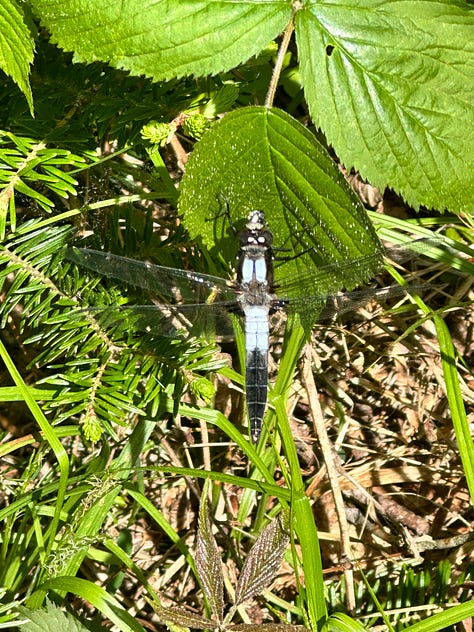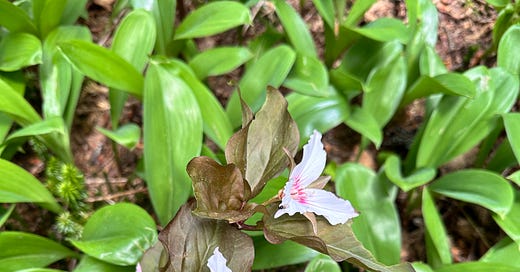What a difference a few months, better preparation, and better weather make. Back in September, my friend Kelley and I embarked on the first leg of a bit-by-bit, multi-year project to hike Vermont’s Long Trail. At 270 miles, the trail actually begins in Massachusetts and then runs the length of the Green Mountain State to the Canadian border. Kelley says it’s referred to in many places as the toughest long-distance trail in the United States. I’m ok with that.
Last fall, my husband dropped us off at the trailhead in North Adams, MA in a pounding rain and apparently shook his head and wondered what we’d gotten into. We were carrying packs that weighed 50 pounds. Each. It’s a bit embarrassing to admit this, pack-weight seen often as a mark of naivete or error or lack of preparation altogether. But if Cheryl Strayed can admit to an overly heavy pack, then so can we. And as I’ve read Strayed say somewhere, when she began her hike of the Pacific Crest Trail, she was over-prepared, not under. Hence, too much stuff in her pack.
Our packs for that first Long Trail leg were so heavy we had to help each other get them on. I still don’t quite understand how we hiked ten miles, in pouring rain, up 3,500 feet of elevation gain that first day and didn’t simply collapse.
And I didn’t even mention the mud. We were up to our ankles (literally) in mud for that day and the next two until Kelley’s husband collected us at the other end. Let’s just say that that three-day hike back in the fall was quite a challenge.
We regrouped. We learned. We tried again last week.
This time, we did a better job of choosing and packing our food. We opted for smaller bear canisters—half the size of the ones we’d taken before. These canisters are heavy even when they’re empty. But you need them, given the black bears that roam the Vermont woods. If you’re always camping at a shelter, you can rely on the metal, chain-secured vaults provided. But if you intend to sometimes set your tent up elsewhere, as we did, you need your own storage method. And a bear-bag won’t suffice in New England forests, given the general lack of suitable branches from which to hang it.
We brought smaller bear canisters, and much lighter food. Ramen. Lots of ramen. Add powdered peanut butter and dehydrated vegetables and you’ve got pad Thai—once you add the hot water. We each swapped out our original packs for much lighter ones. Kelley reminds me that I declared my hatred of my pack back in September within hours of starting. It was bulky. It didn’t have any attachment points on the exterior!1 I couldn’t cinch the hip belt enough to load the weight there, so the straps landed hard on my shoulders. When I got back home, I discovered a gash on my left shoulder I didn’t even know the pack had been generating over those three days.2
And on we went, for four days of hiking last week, during which the weather gods smiled on us and repaid us for the fall’s ickiness with blue skies and perfect temperatures. Even the swarms of black flies couldn’t diminish the loveliness of the days. We had hats equipped with bug nets!
But the true test of an experience in the outdoors lies not in what you plan but in what you don’t foresee. And I am very proud of us for how we handled a situation that cropped up within hours of our start. At a stream crossing, we stopped to fill up our water so we would have enough for cooking that night’s dinner and the next day’s breakfast. (We could see on our map that it might be the last water source before camp that day.) I filled my one-liter bottle from the stream, screwed the filter on top, and began to squeeze now-filtered water from that bottle into my empty. I noticed water dribbling out between the bottle and the filter, unscrewed the filter to take a look. The gasket was missing. At which point I instantly recalled the brief dialogue in my kitchen the night before.
Husband: “What’s this little white thing?”
Me: “Huh. Dunno. Some sort of gasket.”
End scene
The much-needed gasket for my water filter was on the kitchen counter in Cambridge, and I was in the woods of southern Vermont, thirsty.
First I tried a hair elastic curled into the space. But the elastic wouldn’t stay put. Then Kelley had the idea to take a cap from the plunger-cleaner for her water filter, made by the same company and thus possibly the same diameter, and slice it in half. I pulled out my multi-tool, opened up the knife/saw, and proceeded (miraculously without drawing blood!) to slice in two a piece of rubber the size of a Polo mint. But this was a tad too large in external diameter and wouldn’t fit into place. “Can you whittle it?” Kelley asked. So, I took this Lifesaver-sized thing and began whittling around the edge of it, taking the tiny rubber pieces and putting them in my pocket so as to leave no trace, where possible. And in the end, with the prodding from the pliers on my multi-tool, the makeshift gasket fit. No more water was leaking from the filter, and I spent the next four days drinking perfectly filtered water.
We had encountered a problem, we found a solution, we succeeded in the solution. Nobody got frustrated, nobody swore, nobody bled, and we made our way onward. We were self-reliant.

And this is the key thing, I think. While it’s true that we were self-reliant the minute we stepped onto the trail—given the fact that that section of the Long Trail really doesn’t have any outlet/retrieval points until you’ve gone 22 more miles—the real self-reliance didn’t begin until we had to take what we already had with us and make something new out of it. There’s a difference between simply drawing down the supplies you’ve brought with you and using those supplies to create something you need. With the MacGyvering of the Gasket (as it shall heretofore be known), we created something unexpected and unforeseen—and necessary.
Yes, Kelley now lacks a cap for the plunger of her water filter (which we knew we could do without unless there was a dire need to clean that filter on the trail). Yes, we’ll have to buy her a new one. We all know the first law of thermodynamics that talks about the conservation of energy. We moved a piece of rubber from one state to another. We gained a gasket but we lost a plunger cap, and the net remained the same. Still, it was exhilarating and fun to meet a setback with this kind of success.3
This Long Trail project of ours has captured our imaginations—and taken over the WhatsApp thread of our near-daily conversations. How can we travel lighter? What’s a better calorie-to-weight-ratio snack than the trail mix I scarfed each day? How many days each year can we get out onto the Long Trail? How old will we be when we finish?!
As with so many things, adventur-y or creative or athletic, much of the task and the joy lies in the iteration. You repeat, but you change. You redo, but you adjust. Even as each repetition, each leg of the trail, offers slightly different challenges and wonders. For us, this time, in place of mud and plentiful orange salamanders, we had mountain laurel, and trillium, and swallowtail butterflies, and dragonflies, and moose scat and beaver ponds. Beech forests and kneeling birches and hemlocks. And we walked, repeating a motion over and over, hour after hour, discovering, inventing, and revising with every step.



In the spirit of noble suffering, I will not name the brand or pack model. Suffice it to say that I hated it, and, thanks to the REI return policy that Cheryl Strayed made famous, I exchanged it the day after we returned.
In fairness to the pack, I had surely loaded it beyond it’s suitable weight capacity. Still. I hated it.
Also, let’s be clear, if we hadn’t fixed my filter, we would have used Kelley’s to filter all our water. But that would have taken a lot more time each day and left us vulnerable to dehydration or, worse, contaminated water.





I've had the privilege of getting to backpack for 40 years thanks to my dad. Working through the unforeseen that occurs in almost every pack is empowering. Something happens, and you just have to figure it out. There's no out. It makes everyday life seem simpler and easier. I'm glad I just found your substack.
Bravo! Your post inspires me to get my pack and lightweight gear ready and to use it later this summer.